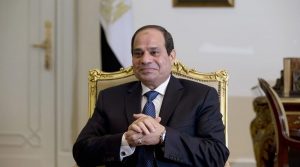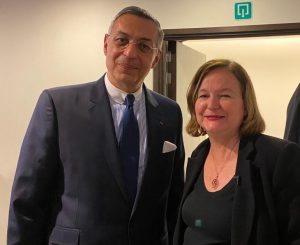
Egypt is not doing very well – a fact everyone seems to be aware of except for Egypt itself. The past year has entailed potato and water shortages, rising inflation, and while it is difficult to find unbiased polls, a recent UAE-funded survey found that only 19% feels the country is moving in the right direction.
Aside from the government and its supporters, everyone else can see that Egypt is perpetually sinking and will continue to sink unless some serious changes happen. It is appropriate to say “perpetually sinking” because there is no bottom, no “game over.” The country will just continue to sink further and further into authoritarianism, debt, and public discontent, but the prospects of any significant change to the current situation look so slim that perhaps it explains why President Abdel Fattah al-Sisi does not feel he has much to worry about. Why are the prospects so slim? Because the president and his cronies have powerful friends (ie. Saudi Arabia) and are not afraid to rely heavily on oppression to keep the country under their control, raising the stakes for any challenger.
Egypt is firmly on Saudi Arabia’s side on any and all issues. It cut off diplomatic ties with Qatar in the 2017 Gulf crisis, its relations with Turkey remain at the chargés d’affaires level (Egypt has its own reasons for this as well as those of Saudi Arabia), and any real thaw with Iran is likely to stay outside of the realm of possibilities – these three being the three countries at the top of Saudi Arabia’s list of enemies. So zealous is Egypt’s support for Saudi Arabia that it even weighed into Saudi Arabia’s recent crisis with Canada in support of the Kingdom. It has also donated two islands in the Red Sea to Saudi Arabia despite the contrary decision of the Egyptian supreme court , and in return for its support and loyalty, it is handsomely rewarded: Saudi Arabia provides tens of billions of dollars to Egypt in aid and fuel supplies that it is highly dependent on, a proposed bridge to connect the two countries over the Red Sea would purportedly generate $200 billion of trade revenues per year, and perhaps most importantly, Sisi knows he has Saudi Arabia’s unconditional support against the Muslim Brotherhood – their common enemy.
It is a deal that works well for Sisi, who came to power after the Muslim Brotherhood’s elected president Morsi was ousted by the military in a bloody coup (led by none other than then-General Sisi). The ouster included the massacre of at least 800 pro-Muslim Brotherhood protesters in Rabaa Square alone. Since then, hundreds, if not thousands of people, composed not only of Muslim Brotherhood members and supporters but also of human rights defenders, political critics, journalists, NGO workers, and others have been subject to arbitrary detentions, asset freezes, unfair trials, and death sentences. According to Human Rights Watch, Egypt is now going through one of the worst human rights crises the country has experienced in decades.
Despite this, or one might argue because of it, the Egyptian government and security forces have had to step up their efforts to both fight extremism and crack down on any and all political dissent, particularly from Muslim Brotherhood members and supporters, lest they come back with a vengeance one day. Egypt’s inability to secure the Sinai Peninsula so far, where ISIS is rampant and the Egyptian military has struggled for years to assert authority and order, has resulted in repeated attacks particularly targeting the Coptic Christian community. The government also continues to persecute and prosecute Muslim Brotherhood members and supporters out of existence: it banned the group from politics in 2013 and the witch hunt continues to this day. Former president Hosni Mubarak is appearing in court this week to testify against Mohamed Morsi (who was already sentenced to death in 2015) on charges related to his own ouster in 2011. There is also an effort to lobby the West to designate the Muslim Brotherhood as a terrorist organization. It all strongly resembles the beginning of a film we have seen many times before in the Middle East: ruthless and indiscriminate oppression convincing more and more people that violence is the only way to achieve their goals. In 2014, one Brookings Institution op-ed ominously predicted that the radicalization of the Muslim Brotherhood is less a question of “if” than “when”, and if things continue this way, with a repressive Egyptian government propped up by external actors, a backlash will come.
And whether things will continue this way is not much of a mystery either: Egypt is now preparing to cancel the two-term limit to presidency, which would clear the way for Sisi to remain in power beyond the second term he is currently serving. A court recently agreed to consider a petition to change the constitution to this effect. As such, it seems highly likely that Egypt’s future will follow a script that is quite similar to cases we have seen before.
By Ardavan Amir-Aslani























